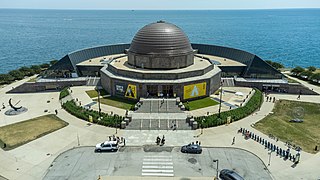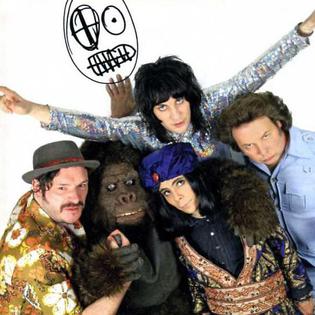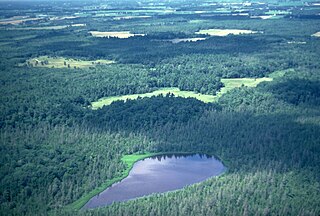
The Adler Planetarium is a public museum in Chicago, Illinois, dedicated to astronomy and astrophysics. It was founded in 1930 by local businessman Max Adler. Located on the northeastern tip of Northerly Island on Lake Michigan, the Adler Planetarium was the first planetarium in the United States. It is part of Chicago's Museum Campus, which includes the John G. Shedd Aquarium and The Field Museum. The Planetarium's mission is to inspire exploration and understanding of the universe.

The Mighty Boosh is a British comedy troupe featuring comedians Julian Barratt and Noel Fielding. Developed from three stage shows and a six-episode radio series, it has since spanned a total of 20 television episodes for BBC Three which aired from 2004 to 2007, and two live tours of the UK, as well as two live shows in the United States. The first television series is set in a zoo operated by Bob Fossil, the second in a flat and the third in a secondhand shop in Dalston called Nabootique.

Catalina Sky Survey is an astronomical survey to discover comets and asteroids. It is conducted at the Steward Observatory's Catalina Station, located near Tucson, Arizona, in the United States.

The Phoenix was the name of several alternative weekly periodicals published in the United States of America by Phoenix Media/Communications Group of Boston, Massachusetts, including the Portland Phoenix and the now-defunct Boston Phoenix, Providence Phoenix and Worcester Phoenix. These publications emphasized local arts and entertainment coverage as well as lifestyle and political coverage. The Portland Phoenix, which was published until 2023, is now owned by another company, New Portland Publishing.

Citizen science is scientific research conducted with participation from the general public. There are variations in the exact definition of citizen science, with different individuals and organizations having their own specific interpretations of what citizen science encompasses. Citizen science is used in a wide range of areas of study, with most citizen science research publications being in the fields of biology and conservation. There are different applications and functions of citizen science in research projects. Citizen science can be used as a methodology where public volunteers help in collecting and classifying data, improving the scientific community's capacity. Citizen science can also involve more direct involvement from the public, with communities initiating projects researching environment and health hazards in their own communities. Participation in citizen science projects also educates the public about the scientific process and increases awareness about different topics. Some schools have students participate in citizen science projects for this purpose as a part of the teaching curriculums.

Christopher John Lintott is a British astrophysicist, author and broadcaster. He is a Professor of Astrophysics in the Department of Physics at the University of Oxford, and since 2023 is the Gresham Professor of Astronomy at Gresham College, London. Lintott is involved in a number of popular science projects aimed at bringing astronomy to a wider audience and is also the primary presenter of the BBC television series The Sky at Night, having previously been co-presenter with Patrick Moore until Moore's death in 2012. He co-authored Bang! – The Complete History of the Universe and The Cosmic Tourist with Moore and Queen guitarist and astrophysicist Brian May.

The first series of The Mighty Boosh was originally broadcast between 18 May 2004 and 6 July 2004. It features five main cast members: Julian Barratt, Noel Fielding, Rich Fulcher, Michael Fielding and Dave Brown, and centres on Howard Moon and Vince Noir, and the adventures they have whilst working at a zoo. A DVD of the series was released on 29 August 2005 in Region 2. Series 1 began to air in America on Adult Swim from 29 March 2009.

The Cedar Creek Ecosystem Science Reserve is an ecological research site located primarily in East Bethel, Minnesota in the counties of Anoka and Isanti on the northern edge of the Minneapolis-Saint Paul metropolitan area.
Fil Barlow is an Australian artist, cartoonist, writer, production designer currently based in Los Angeles. Barlow is the creator of the Zooniverse comic book published in 1986-87.

Zooniverse is a citizen science web portal owned and operated by the Citizen Science Alliance. It is home to some of the Internet's largest, most popular and most successful citizen science projects. The organization grew from the original Galaxy Zoo project and now hosts dozens of projects which allow volunteers to participate in crowdsourced scientific research. It has headquarters at Oxford University and the Adler Planetarium. Unlike many early internet-based citizen science projects which used spare computer processing power to analyse data, known as volunteer computing, Zooniverse projects require the active participation of human volunteers to complete research tasks. Projects have been drawn from disciplines including astronomy, ecology, cell biology, humanities, and climate science.

Old Weather is an online weather data project that currently invites members of the public to assist in digitising weather observations recorded in US log books dating from the mid-19th century onwards. It is an example of citizen science that enlists members of the public to help in scientific research. It contributes to the Atmospheric Circulation Reconstructions over the Earth initiative. Data collected by Old Weather has been used by at least five different climate reanalysis projects, including HURDAT, SODA and ECMWF. In February 2013, the project was awarded the Royal Meteorological Society IBM Award for Meteorological Innovation that Matters.

SciGirls is an American live-action/animated children's television series that premiered on February 11, 2010 on PBS Kids. It has a mix of live-action and animated segments. It is produced by Twin Cities PBS and builds on the "real kids doing real science" approach of DragonflyTV.

Disk Detective is the first NASA-led and funded-collaboration project with Zooniverse. It is NASA's largest crowdsourcing citizen science project aiming at engaging the general public in search of stars, which are surrounded by dust-rich circumstellar disks, where planets usually dwell and are formed. Initially launched by NASA Citizen Science Officer, Marc Kuchner, the principal investigation of the project was turned over to Steven Silverberg.

Asteroid Zoo is a citizen science project run by the Zooniverse and Planetary Resources, to use volunteer classifications to find unknown asteroids using old Catalina Sky Survey data. The main goals of the project are to search for undiscovered asteroids in order to protect the planet by locating potentially harmful Near-earth asteroids, locate targets for future asteroid mining, study the solar system, and study the potential uses and advantages of people looking through the images over computers. It was created along with the ARKYD project through Kickstarter, funded with just over 1.5 million dollars.
Catherine Margaret Corrigan, often known as Cari Corrigan, is an American scientist best known as a curator of the meteorite collection at the Smithsonian Institution. She is a scientist in the Department of Mineral Science at the National Museum of Natural History.
Vizzuality is a science and technology company focused on data visualization, web-GIS and tool development and committed to working on projects related to conservation, the environment and sustainable development. They have offices in Madrid, Cambridge and Porto.

Jessie Christiansen is an Australian astrophysicist working at the NASA Exoplanet Science Institute at the California Institute of Technology (Caltech). She won the 2018 NASA Exceptional Engineering Achievement Medal for her work on the Kepler planet sample.
Exoplanet Explorers was a Zooniverse citizen science project aimed at discovering new exoplanets with Kepler data from the K2 mission. The project was launched in April 2017 and reached 26.281 registered volunteers. Two campaigns took place, the first one containing 148.061 images and the second one 56.794 images.
Lucy Frear Fortson is an American astronomer known for her work on gamma-ray astronomy and Galaxy morphological classification and for her leadership of citizen science projects including the Galaxy Zoo and Zooniverse. She is a professor in the School of Physics and Astronomy at the University of Minnesota.












